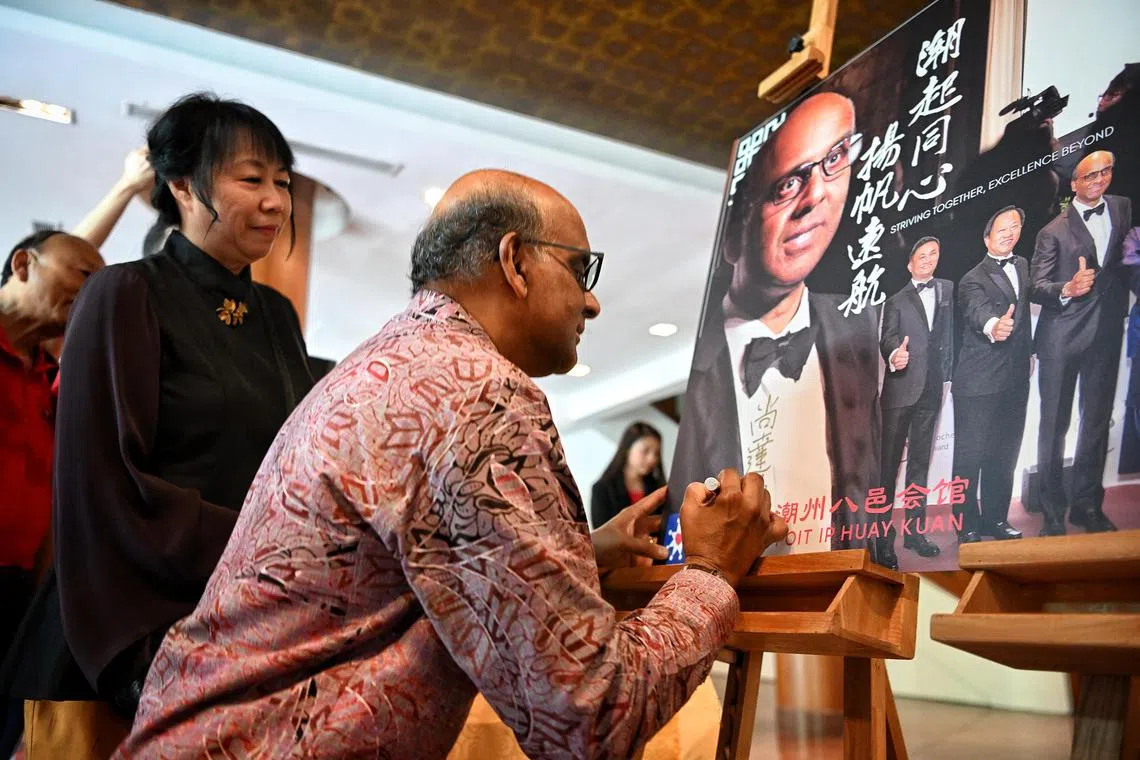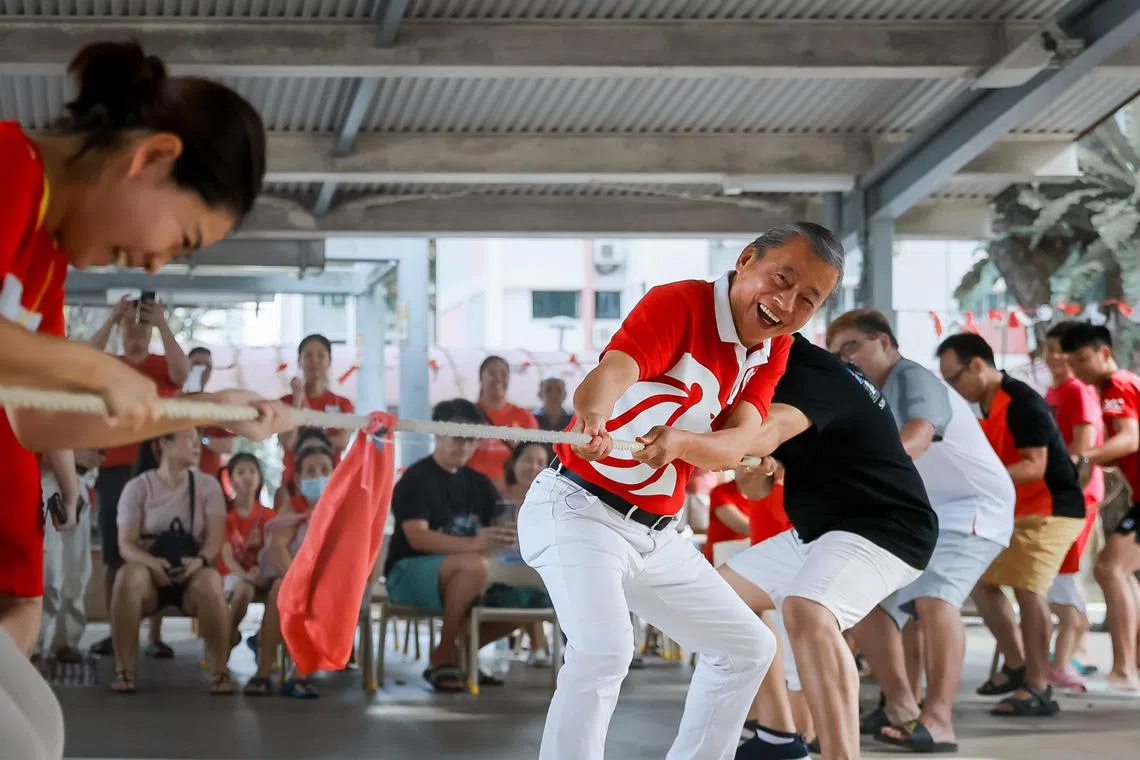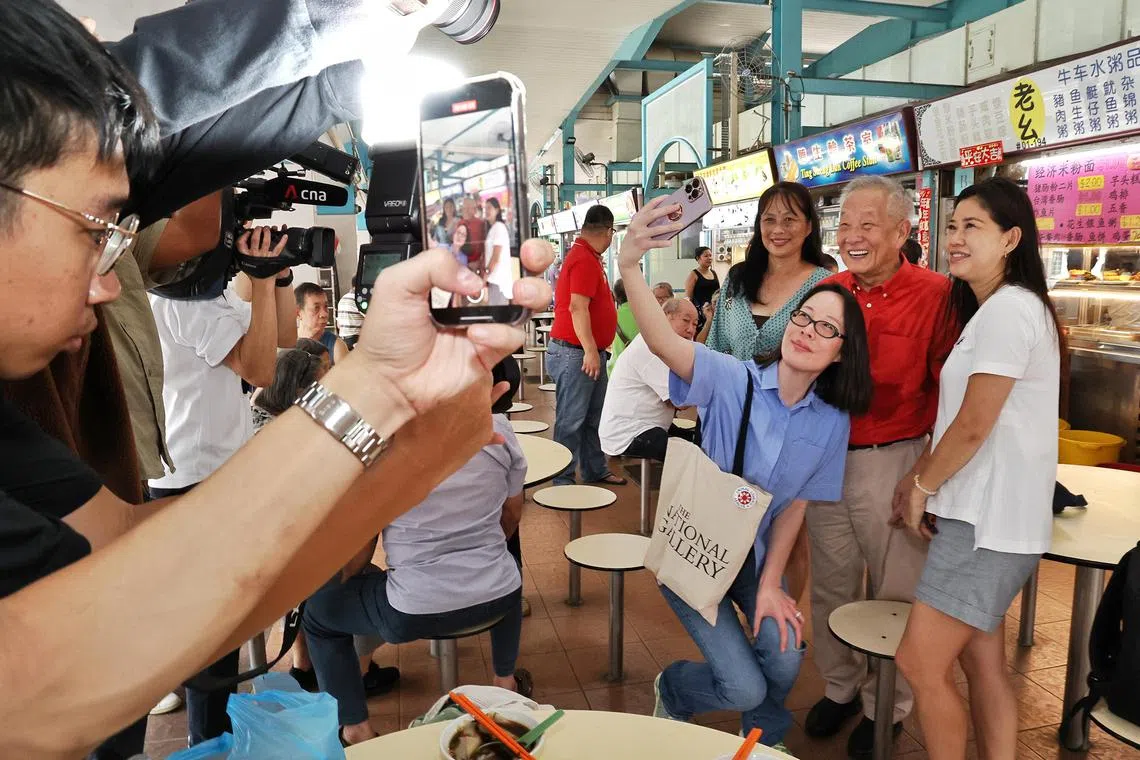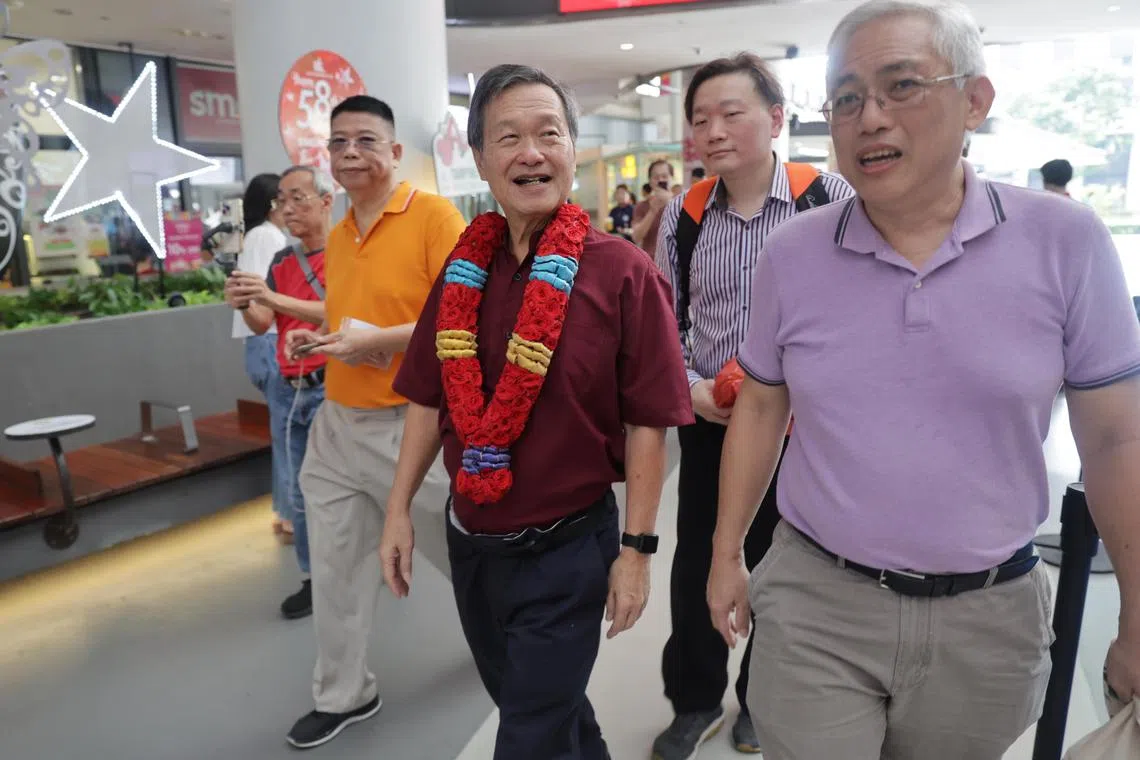Presidential election candidates encouraged to use social media, TV; rallies not recommended: ELD
Sign up now: Get ST's newsletters delivered to your inbox

The ELD had on Friday announced that Nomination Day would be on Aug 22, and Polling Day on Sept 1, should there be a contest.
ST PHOTO: GAVIN FOO
Follow topic:
SINGAPORE - Candidates in the upcoming presidential election are encouraged to use platforms that reach out to voters at large, such as broadcasts and social media, the Elections Department (ELD) said on Saturday.
In-person rallies are not encouraged, and there are no designated rally sites for presidential elections, it added.
This is because rallies, by their nature and format, may be divisive and not congruent with the unifying role of the elected presidency, said ELD.
Prime Minister Lee Hsien Loong had issued the Writ of Election on Friday,
On Saturday, the department issued campaigning guidelines covering various matters, such as election advertising and foreign interference.
Each candidate will be allocated two blocks of 10 minutes’ airtime, free of charge, to make his statements across 19 Mediacorp TV channels, and Mediacorp, SPH and SoDrama! radio channels.
The first one will be televised on Aug 24, two days after Nomination Day. The second will be televised on Aug 30, the last day of campaigning before Cooling-off Day.
Candidates may use the four official languages of English, Mandarin, Malay and Tamil to deliver their messages on these broadcasts, though the content has to be the same across languages. Only candidates themselves can deliver the broadcast, as stand-ins will not be permitted.
The order of the candidates in the first broadcast will be by alphabetical order of their names according to the electoral roll. This order will be reversed for the second broadcast.
So far, there are four presidential hopefuls: former senior minister Tharman Shanmugaratnam, 66; entrepreneur George Goh, 63; former GIC investment chief Ng Kok Song, 75; and former NTUC Income chief Tan Kin Lian, 75.
On Aug 27, SPH Media will release a video, recorded live, with presidential candidates answering questions from younger Singaporeans. This will be put up on The Straits Times website and social media platforms.
A presidential forum by Mediacorp will be broadcast live on CNA on Aug 28. There will also be live streams on CNA’s YouTube and Facebook channels. A repeat telecast of the forum will run on Channel 5 on Aug 29.
Should candidates wish to hold physical election meetings, they will have to obtain the approval of the premises or site owner before applying for a police permit.
Due to safety and security considerations, candidates are encouraged to hold such election meetings, if any, at sports stadiums or indoor venues, said ELD.
Applications for a police permit may be submitted only after the close of nomination proceedings on Aug 22. They must be submitted at least two days before the intended date of the election meeting. This means the earliest day for an election meeting is two days after Nomination Day.
Online campaigning
Candidates can also make use of online campaigning, such as by publishing election advertising on social media platforms and websites, and sending the advertisements via e-mail.
They have to comply with the rules for online election advertising under the Presidential Elections Act and Presidential Elections (Election Advertising) Regulations.
For example, these online ads must include the details “paid for by” and “sponsored by”, while ads sent via e-mail must come from a functioning e-mail address that is clearly displayed, where recipients may reply to indicate their desire not to receive any more such materials.
Candidates and voters also must not make, exhibit or distribute party political films. Examples include films that employ dramatisation or animation to distort, sensationalise or mislead viewers on political matters, said ELD.
Results of election surveys and exit polls are also not allowed from the day that the Writ of Election is issued till Polling Day.
Online conduct
The public should engage in responsible online behaviour to safeguard the integrity of the presidential election, the authorities have urged.
This includes being alert to misinformation, posts containing falsehoods and manipulated content like deepfakes, aimed to deceive the public and influence the election outcome, the police and the Ministry of Communications and Information said separately on Saturday.
In a joint advisory, they said Singaporeans have the right to participate in online discussions on the election, but should refrain from behaviour which may be offences under the law.
Members of the public should take care not to post or share content containing falsehoods and misleading or manipulated content. If unsure about the content, they should verify the information against official sources and not forward or repost them.
Anyone who spreads misinformation and disinformation online may be liable for an offence of communicating false message under the law. Action may also be taken against those who communicate online falsehoods, or misleading or manipulated content, under the Protection from Online Falsehoods and Manipulation Act, they said.
Harassment, such as doxxing by publishing personal information online in order to harass, threaten or facilitate violence against someone, is punishable under the Protection from Harassment Act. The public is advised to engage in online discussions on the election in a civil manner, said the agencies.
People should also not make online posts with deliberate intent to wound racial feelings, promote enmity between different groups on grounds of race or engage in conduct that incites hatred on religious grounds.
The police said they will not hesitate to take firm action against offenders.
Election expenses
Candidates can spend up to $812,822.10 in election expenses, said ELD.
This is based on the maximum spending limit in the Presidential Elections Act, which is $600,000 or 30 cents per registered voter, whichever is greater.
This amount was $754,982.40 in the 2017 presidential election.
Only Singapore citizens aged 21 or older, or Singapore-controlled companies which carry on business wholly or mainly in Singapore, are allowed to make political donations.

Mr Tharman Shanmugaratnam, with his wife Jane Ittogi, signing a poster before taking part in a dialogue at the Teochew Poit Ip Huay Kuay on Aug 12, 2023.
ST PHOTO: CHONG JUN LIANG
Banners, posters and flags
The public display of traditional election advertising such as banners, flags or posters must comply with the law and regulations.
For example, they must include information on who authorised the public display, who approved it, who it is publicly displayed for, who paid for it and who printed it.
These ads also must not contain illegal content, such as seditious materials or materials that may cause alarm and distress, said ELD.
Candidates may use these means of advertising as long as they comply with the controls on quantity, size, location, manner of and period of display, as well as any further conditions stated in the Returning Officer’s permit.
Any such advertisement that does not adhere to these conditions may be directed for removal by the Returning Officer. Should this occur, candidates will have to bear the expenses to remove each unauthorised banner, flag or poster at $50 per piece. This cost must then be included as part of the candidates’ election expenses.
Candidates may also use vehicles to broadcast pre-recorded election messages during the campaign period. They must apply for and obtain a police permit to do so.
However, they are not allowed to give speeches from the vehicles or provide public entertainment during the broadcast of the messages. Vehicles with open decks are not allowed to carry any persons on the decks.

Mr George Goh playing a game of tug-of-war with school staff and parents during Ang Mo Kio Presbyterian Preschool’s National Day celebration on Aug 8, 2023.
ST PHOTO: GAVIN FOO
Foreign interference
ELD said that foreign interference includes attempts by foreign actors to manipulate domestic politics through covert and deceptive means, which undermines political sovereignty and harms social cohesion.
Candidates have a responsibility to raise their awareness of potential foreign interference threats, be on the alert for suspicious behaviour and hidden agendas, and take precautions such as fact-checking information and monitoring their social media platforms, it added.
Candidates who suspect they are the target of foreign interference activities should make a police report and keep ELD informed.
Only Singapore citizens can take part in elections and campaigning. Any Singaporean who wants to conduct an election activity for a candidate, whether online or offline, must first have written authority signed by the candidate or his election agents.
Individuals under the age of 16, who have been subject to the Criminal Law (Temporary Provisions) Act, foreigners and foreign entities are prohibited from taking part in any election activity.
This excludes permanent residents or work-pass holders who are contracted by authorised persons to carry out set-up or tear-down of traditional election advertisements, or rally sites.
ELD also advised against negative campaigning based on hate and denigration of opposing candidates. Candidates, election agents and their authorised representatives should conduct election campaigning in a responsible and dignified manner that befits the seriousness of the election process.
They should not make false statements, such as unfounded allegations of corruption or criminal offences, or statements that may cause racial or religious tensions or affect social cohesion.
Campaigning by political parties
Political parties should not be involved in campaigning using their party names and symbols in support of a candidate.
The position of the president is non-partisan, said ELD.
Civic, business or professional bodies that wish to participate in any political activity or allow their funds or premises to be used for political purposes need to ensure that their constitutions allow them to do so, and that they do not contravene any laws they are subject to.
These political activities include endorsing certain candidates and publishing advertisements, or issuing press statements to express support for a candidate.
ELD said that the form of a presidential election campaign should differ fundamentally from that of a general election campaign, given the different roles that the elected president and elected government perform.
“The president should remain above the political fray. It is not his role to support or oppose the government of the day or to advance his own agenda or policies,” it said.
The focus of the presidential election campaign should therefore be on the suitability and integrity of candidates to discharge the functions of the president, while maintaining the dignity of the office, it added.

Mr Ng Kok Song and his fiancee Sybil Lau (in blue top) taking a wefie with residents while on a walkabout at The Marketplace@58 in New Upper Changi Road on Aug 11, 2023.
ST PHOTO: HESTER TAN
No public assembly at Speakers’ Corner during election period
The police also gave an update on the use of Speakers’ Corner during the presidential election.
From Nomination Day on Aug 22 until Polling Day on Sept 1, the exemptions for public assemblies and public processions at the open space at Hong Lim Park will be temporarily revoked.
This is to ensure the permit regime for election meetings during the presidential election also applies to the Speakers’ Corner, it said. During this period, no public assembly or procession may be held there without a police permit.
The police also said that in the case of any outdoor election meetings, such as rallies or gatherings at assembly centres, these locations will be designated “no-fly” zones.
The Civil Aviation Authority of Singapore (CAAS) will establish a temporary restricted area over locations used for outdoor election meetings if they do not fall within an existing “no-fly” zone.
The flying of unmanned aircraft and other aerial activities such as kite-flying are prohibited within and into these zones, unless authorised by CAAS.
Unmanned aircraft are not allowed to be operated at all election meetings, regardless of whether they are held indoors or outdoors, said the police.

Mr Tan Kin Lian and his team during his first walkabout on Aug 12 at Our Tampines Hub, where he greeted residents and spoke with stall vendors.
ST PHOTO: GIN TAY


